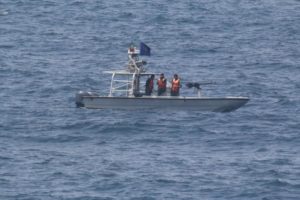by WorldTribune Staff, July 13, 2016
Iran sent four machine gun-laden speed boats and a guided missile patrol ship to hassle a U.S. warship that was transiting the Strait of Hormuz on July 11, the U.S. Navy said.
The Iranian Revolutionary Guard Corps (IRGC) vessels came as close as 500 yards to the USS New Orleans, an amphibious dock ship with about 650 Marines and Army Gen. Joseph Votel on board.

“As you’ve seen in a relatively compressed space here, there is great opportunity for miscalculations,” Votel, head of the U.S. military’s Central Command, told reporters on the bridge of the New Orleans.
One of the four speedboats that approached the New Orleans and its escort, the USS Stout guided missile destroyer, cut its engines and watched as the U.S. warships passed. An hour before, a larger Iranian guided-missile patrol craft came by, the Navy said.
U.S. officials said that 90 percent of the U.S. Navy’s roughly 250 transits through the Strait of Hormuz each year are safe, but 10 percent are classified as unsafe, abnormal or unprofessional.
“We don’t always have a lot of time to deal with those interactions. I think what we’ve probably learned here today is that it’s measured in minutes,” Votel said.
In January, Iran detained 10 U.S. sailors after their vessels strayed into Iranian waters. A U.S. Navy report also said the Iranians replaced an American flag on board with an IRGC one, ransacked the vessels, and damaged equipment.
Votel said Iran needed to be held accountable for its behavior and scorned its treatment of the U.S. sailors, adding that the U.S. Navy has given assistance to 11 Iranian-flagged vessels in distress in the Persian Gulf since 2012.
“If we came across a ship, a small vessel in the area, we would try to assist it,” Votel said.
Karim Sadjadpour, an Iran analyst at the Carnegie Endowment for International Peace, said there were no signs of a change in the IRGC’s culture of viewing the United States as an inherent threat.
“Ayatollah Khamenei, the commander in chief of the IRGC, regularly praises Iranian officials who defy the U.S. and scorns officials who advocate cooperation with the U.S.,” Sadjadpour said. “I haven’t seen any signs that this institutional culture has changed after the nuclear deal.”
